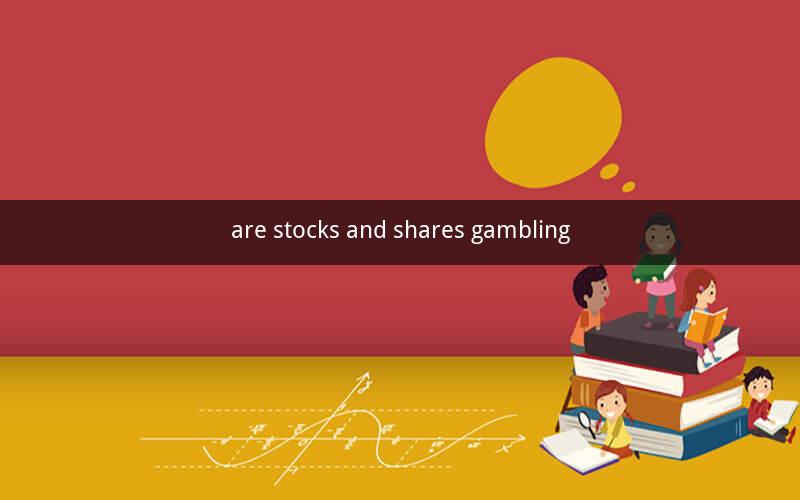
Are Stocks and Shares Gambling?
Table of Contents
1. Introduction to Stocks and Shares
2. Understanding the Concept of Gambling
3. Similarities and Differences Between Stocks/Shares and Gambling
4. Risks Involved in Investing in Stocks and Shares
5. Risks Involved in Gambling
6. The Role of Skill, Knowledge, and Luck
7. The Importance of Diversification
8. The Role of Professional Advice
9. Conclusion
1. Introduction to Stocks and Shares
Stocks and shares represent ownership in a company. When you buy stocks or shares, you are essentially buying a portion of that company. The value of your investment is directly tied to the performance of the company, which can be influenced by various factors such as the company's earnings, the overall economy, and market sentiment.
2. Understanding the Concept of Gambling
Gambling involves placing bets on an uncertain outcome with the intention of winning money. It is characterized by the element of chance, where the outcome is not predetermined. Common forms of gambling include casino games, sports betting, and lottery tickets.
3. Similarities and Differences Between Stocks/Shares and Gambling
Similarities:
- Both involve an element of risk and uncertainty.
- Both can result in financial gain or loss.
Differences:
- Stocks and shares represent ownership in a company, while gambling does not.
- Investing in stocks and shares requires research and analysis, while gambling is usually based on chance.
- The potential returns from stocks and shares are generally higher than those from gambling.
4. Risks Involved in Investing in Stocks and Shares
a. Market Risk: The overall performance of the stock market can affect the value of your investments.
b. Company-Specific Risk: The performance of a particular company can be influenced by various factors, such as poor management, product recalls, or industry changes.
c. Liquidity Risk: Selling stocks and shares may not always be easy, especially if the market is volatile.
d. Inflation Risk: The value of your investment may not keep pace with inflation, leading to a decrease in purchasing power over time.
5. Risks Involved in Gambling
a. Financial Risk: Gamblers can lose a significant amount of money, which may lead to financial problems.
b. Addiction Risk: People can become addicted to gambling, leading to negative consequences in their personal and professional lives.
c. Legal Risk: Some forms of gambling are illegal, and engaging in them can result in legal consequences.
6. The Role of Skill, Knowledge, and Luck
In stocks and shares, skill and knowledge are crucial for making informed decisions. Investors need to research companies, analyze financial statements, and stay updated with market trends. Luck can play a role, but it is not the primary factor.
In gambling, luck is the main element. While some gamblers may develop strategies or systems to improve their chances, the outcome is ultimately determined by chance.
7. The Importance of Diversification
Diversification is a risk management strategy that involves investing in a variety of assets to reduce the impact of any single investment on your portfolio. This approach can help mitigate the risks associated with both stocks and shares and gambling.
8. The Role of Professional Advice
Seeking professional advice can be beneficial for both investors and gamblers. Financial advisors can help investors make informed decisions and manage their portfolios effectively. Gamblers can seek guidance from addiction counselors or professionals who can help them develop healthier gambling habits.
9. Conclusion
While there are similarities between stocks and shares and gambling, the key difference lies in the element of ownership and the role of skill and knowledge. Investing in stocks and shares can be a more sustainable and potentially profitable way to grow wealth, while gambling is largely based on chance and can lead to negative consequences.
Frequently Asked Questions
1. What is the difference between stocks and shares?
- Stocks and shares are essentially the same thing, representing ownership in a company.
2. Can investing in stocks and shares be considered gambling?
- While there are similarities, investing in stocks and shares is not considered gambling due to the element of ownership and the role of skill and knowledge.
3. What are the main risks involved in investing in stocks and shares?
- The main risks include market risk, company-specific risk, liquidity risk, and inflation risk.
4. Can investing in stocks and shares lead to financial gain?
- Yes, investing in stocks and shares can lead to financial gain, but it is important to understand the risks involved.
5. How can one mitigate the risks associated with investing in stocks and shares?
- Diversification and seeking professional advice are effective ways to mitigate risks.
6. Is gambling addictive?
- Yes, gambling can be addictive, leading to negative consequences in personal and professional lives.
7. How can one avoid becoming addicted to gambling?
- Setting a budget, limiting the amount of time spent gambling, and seeking help from professionals are effective ways to avoid addiction.
8. What are the legal implications of gambling?
- Some forms of gambling are illegal, and engaging in them can result in legal consequences.
9. Can professional advice help in both stocks and shares investing and gambling?
- Yes, professional advice can be beneficial in both areas, helping investors and gamblers make informed decisions and manage their risks.
10. What is the role of luck in stocks and shares investing and gambling?
- Luck can play a role in both stocks and shares investing and gambling, but it is not the primary factor. In stocks and shares, skill and knowledge are crucial, while in gambling, luck is the main element.